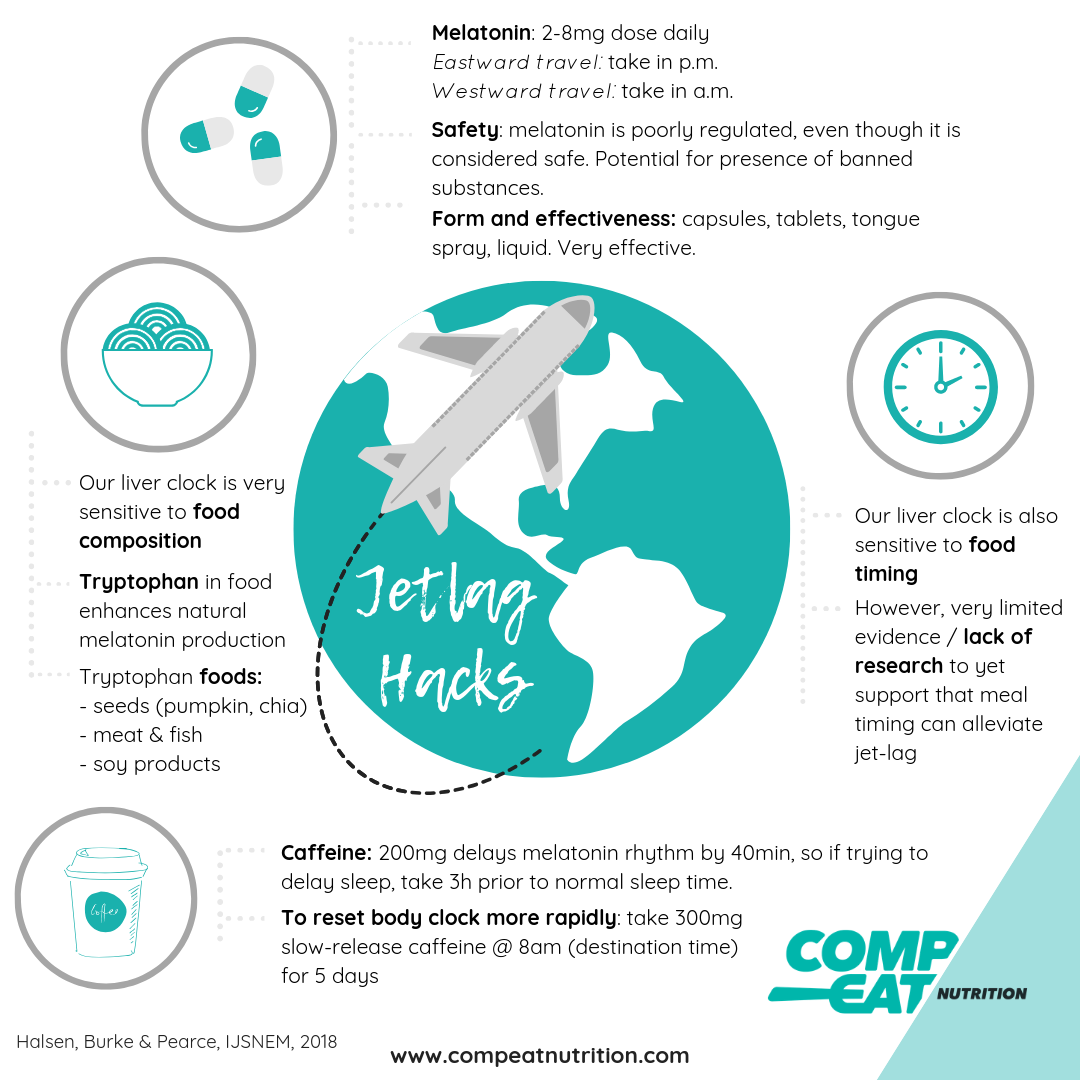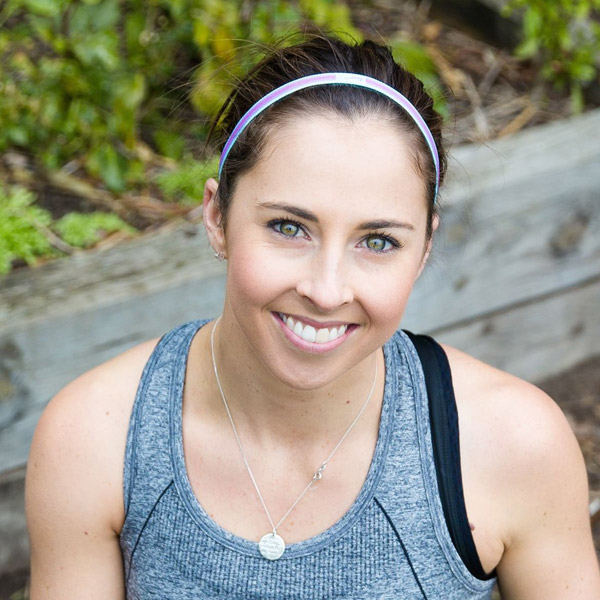Nutrition For Travel
We’ve been jet setting around the globe for over 100 years now, yet many of us give little (if any) thought to preparing for the side effects of crossing the continents.
Rolling with the punches of jet-lag is something that, thanks to curious researchers and those well-travelled, could be much more manageable – at least until some genius invents teleportation!
Jet-lag (aka circadian desynchronisation) is the mismatch between our internal body clock and our environment’s light-dark cycle. Not only does jet-lag eat into valuable time, but it also affects appetite; an appetite for the amazing local food you were so keen to try, or as an athlete, appetite for important fuelling and recovery opportunities. Jet-lag may also cause headaches, gut issues or altered moods.
For the travelling athlete, circadian resynchronisation (realigning our body clock with the local time) is paramount. With typically tight competition turnarounds, an athlete’s calendar doesn’t always accommodate long acclimatisation periods at their destination. Ensuring jet-lag symptoms are addressed early and effectively, ensures that performance is preserved.
In our readings, we were introduced to a gem of a term – Zeitgeibers, a German word that literally translates as ‘time-givers’. These are cues that re-sync our internal body clock to our new local time 1.
So here are your jet-lag Zeitgeibers, from some of the best in the business! (2)

Light Exposure
While not a nutritional intervention, nailing your light exposure timing is the strongest natural zeitgeiber – it would be an oversight for us to gloss over this one! 3
Useful tip: to efficiently adapt at your destination, seek light by turning on indoor lights when it’s dark outside, and avoid light by wearing dark sunglasses during strong sunlight hours.
Melatonin
The brain naturally releases the hormone melatonin at night to promote sleep. Upon wake, we clear melatonin to promote alertness in order to face the day ahead (or we drink coffee – don’t worry, we’re getting to that!).
Melatonin production and clearance is controlled by our body clock; so, if a long-haul flight upsets this, our sleep-wake cycle also takes a hit.4 Melatonin supplements can help to resynchronise our body clock and reduce jet-lag symptoms; effective dosing protocols sit between 2 and 8mg. Be mindful that if you’re purchasing an over-the-counter supplement, it’s hit and miss as to how much active ingredient you’re actually getting. For this reason, a prescription option is usually a safer bet. If you would prefer to source your melatonin from whole foods, 6 pistachios provide approximately 1mg of melatonin. 5
Useful tip: if you are travelling eastward, take melatonin in the afternoon. If you are travelling westward, take melatonin shortly after wake. The reason for this is that when we travel east, our body clock is behind the local time and so we need to advance it. When we travel west, our body clock is ahead of the local time, so we need to delay it.
Caffeine
Caffeine masks the build-up of a molecule in the brain called adenosine, which makes us feel sleepy. It is one of the most common methods to alleviate daytime fatigue while jet-lagged. A dose of 1-3 mg/kg of body weight (70-210 mg for a 70kg person) has been shown to be effective for efficient body clock resynchronisation.
While coffee may seem like your saviour, bear in mind that over-caffeinating comes at a price, with potentially detrimental impacts on sleep in doses above 400mg per day (equivalent to 3-4 shots of coffee). 6
Useful tip: To minimise the impact on sleep and melatonin, take within 6hrs of waking. However, if trying to delay sleep time, taking 200mg caffeine 3-hrs before usual sleep time may help!
Food Composition and Timing
While there is very limited information surrounding meal timing and sleep, current research suggests that what we eat prior to sleep can play a role. We know that tryptophan, a precursor (building block) for melatonin, may increase our natural melatonin production. We also know that combining fat and carbohydrate intake may help more tryptophan to become available for melatonin production.
What does this mean? Tryptophan is found in protein-containing foods, so the reality is that a well-rounded meal containing proteins, carbohydrates and fats, should enhance your natural melatonin production and potentially minimise jet-lag.
Many of our athletes pack creature comforts to ensure that they maintain a balanced diet while travelling, but also to place less strain on digestion usually caused by altitude or foreign food. Considerations include the availability of food at your destination, items for special diets, required sports foods, and logistical considerations like luggage allowances, quarantine laws and additional costs.
Useful tip: consume complete meals containing protein, carbohydrate and fat where possible, and pack (allowed) items from home that might not be readily available at your destination.
Planning food and supplementation to fit in with your travel itinerary can help to reduce symptoms associated with jetlag. Paying close attention to those zeitgeibers (light exposure, melatonin, caffeine, meal timing/composition) will hopefully mean that you can get on with your plans at your destination, rather than falling asleep in embarrassing places!
Reference List:
- Choy M, Salbu RL. Jet Lag – Current and Potential Therapies. Pharmacy & Therapeutics 2011; 36(4): 221-224, 231.
- Halson SL, Burke LM, Pearce J. Nutrition for Travel: From Jet Lag to Catering. Int J Sport Nutr Exerc Metab, 2019; 22: 1-8
- Duffy JF, Czeisler CA. Effect of light on human circadian physiology. Sleep Med Clin 2009; 4 (2): 165-77.
- Fowler, P. M., Knez, W., Crowcroft, S., Mendham, A. E., Miller, J., Sargent, C., … & Duffield, R. (2017). Greater Effect of East vs. West Travel on Jet Lag, Sleep, and Team-Sport Performance. Medicine and science in sports and exercise. 49(12):2548-2561
- Oladi E, et al. Spectrofluorimetric determination of melatonin in kernels of four different Pistacia varieties after ultrasound-assisted solid-liquid extraction. Spectrochim Acta A Mol Biomol Spectrosc, 2014; 132: 326-9
- Drake, C., Roehrs, T., Shambroom, J., & Roth, T. (2013). Caffeine effects on svleep taken 0, 3, or 6 hours before going to bed. Journal of Clinical Sleep Medicine, 9(11), 1195-1200.
The Recovery Room
This Blog post was created in partnership with the Recovery Room. Dr Peter Fowler is an expert in the field of Recovery and Travel.
To find out more, please visit the Recovery Room Website


ALICIA EDGE HEAD SPORTS DIETITIAN
Alicia is the head Advanced Sports Dietitian at Compeat Nutrition. She is also a mum and triathlete, so advice extends beyond the basics and is instead focused on providing effective and achievable nutrition for both training and racing.